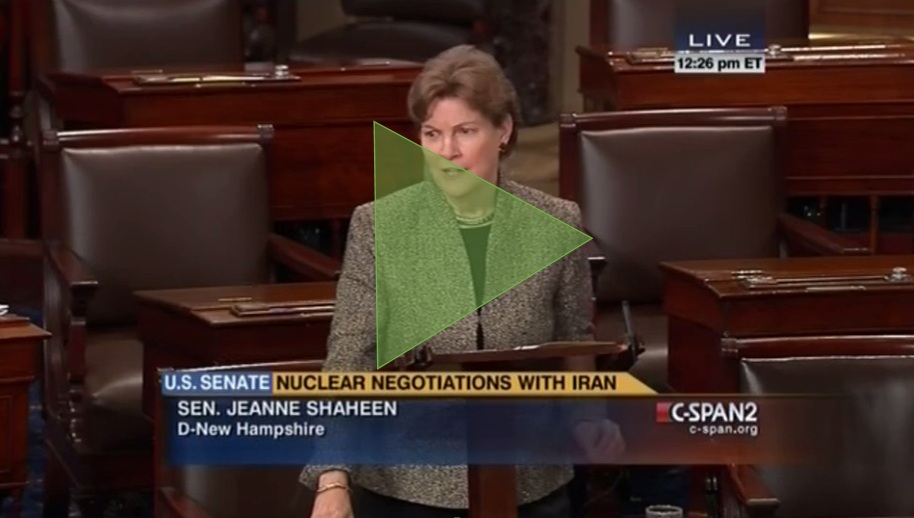SHAHEEN ON SENATE FLOOR: IF BIPARTISAN NATURE OF IRAN LEGISLATION ERODES, IT WILL NO LONGER MERIT MY SUPPORT
(WASHINGTON, DC) – U.S. Senator Jeanne Shaheen (D-NH) made the following statement on the Senate Floor today during the debate on legislation that requires the President to submit to Congress for review any final agreement with Iran to curtail its nuclear program. The bill under consideration passed unanimously out of the Senate Foreign Relations Committee, of which Senator Shaheen is a member. In her remarks, she urged her colleagues to maintain the legislation’s carefully crafted bipartisan agreement and warned that if this was eroded through amendments, she would no longer be able to support it.
Video of her remarks are available here.
A text transcript of her remarks is also provided below:
“Thank you. I came to the floor this morning to discuss the Iran Nuclear Agreement Review Act.
Early this month, Iran and the P5+1 countries agreed to a “framework” deal to restrict Iran’s nuclear program and to submit it to international inspections. Negotiators now have until June 30th to try to reach a final agreement.
At the same time, the Senate has been advancing legislation requiring the President to submit any final agreement to Congress for review. That is the legislation on the floor before us today.
Congress is divided along partisan lines on many issues, but we are united in our conviction that Iran must not be allowed to acquire a nuclear weapon, and that the people’s elected representatives should have the opportunity to review any final agreement with Iran.
This bipartisan consensus was reflected in the Senate Foreign Relations Committee’s unanimous vote in favor of the Iran Nuclear Agreement Review Act. And I want to thank Chairman Corker who’s on the floor here with me today, and Ranking Member Cardin, also on the floor, for their statesmanship and for the spirit of bipartisan compromise that they exhibited in negotiating the act. They did a great job.
According to the legislation, the President must submit any final agreement to Congress. Congress would then have 30 days to hear from negotiators and outside experts, and to determine if additional action is warranted – including a resolution of approval or disapproval.
Now I believe Congressional oversight is appropriate because the President, in order to implement any agreement with Iran, will need to set aside sanctions put in place by Congress. I also voted for this bill because it reasserts the proper role of Congress in providing oversight on the execution of foreign policy.
As a member of the Senate Foreign Relations Committee, I believe that the best way to resolve the standoff over Iran’s nuclear program is a hard-nosed agreement that cuts off all paths Iran could take to pursue a nuclear weapon.
It was therefore crucial for me that the legislation considered by the Committee not hinder our negotiators’ efforts to reach a strong agreement.
I believe that standard should be maintained as the full Senate considers this legislation.
And I believe it’s also essential that the spirit of cooperation and bipartisanship that was demonstrated by Senators Corker and Cardin in forging a bipartisan bill continue this week, as the full Senate takes up the Iran legislation.
Amendments that undermine the Administration’s negotiations or structurally alter this careful bipartisan compromise should be rejected by the Senate.
And while I supported this bill in the Foreign Relations Committee, if the bipartisan nature of the legislation is eroded on the floor, the bill will no longer merit my support.
This a serious matter that will require the Senate to rise above the desire of some to force votes on poison pill amendments that would destroy the bipartisan balance.
We have to rise above politics here because we are confronted by a dangerous and unacceptable status quo in Iran.
The benefits of a strong final deal could be significant. Such a deal would stop Iran from acquiring a nuclear weapon and ensure that it cannot pursue destabilizing activities in the region with impunity; it would prevent a nuclear arms race in the Middle East and advance greater long-term security for our regional allies.
That’s why, even as Congress reaffirms its role in reviewing any final agreement, we need to give the Administration and its international partners every opportunity to bring these difficult negotiations to a successful conclusion.
With so much at stake for the United States, for Israel, and for the entire world, it is more important than ever that the Senate rise above partisan politics and reaffirm bipartisan cooperation. Thank you Mr. President I yield the floor.”
